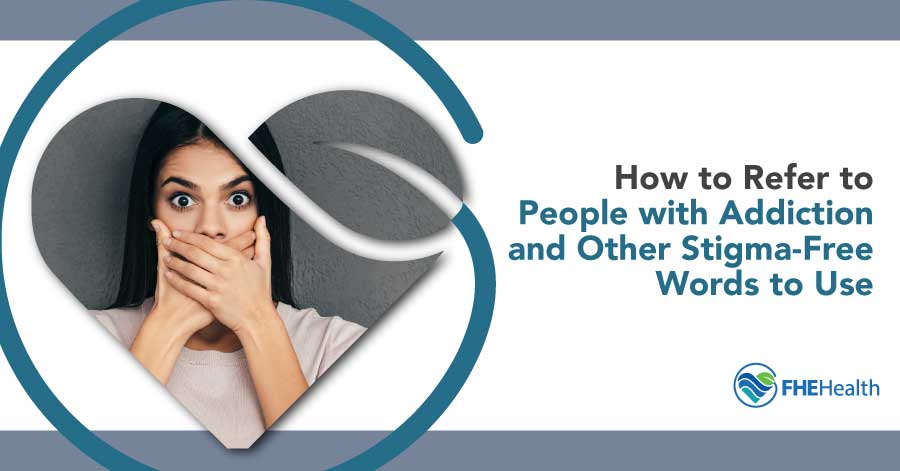
As the stigmas surrounding addiction continue to decline, more and more people are willing to speak up and speak out about struggling with addictive behaviors. Celebrities are now coming forward with their personal challenges, rehabilitation programs are more widely available than ever and educational institutions are putting an increased focus on teaching counselors and doctors about managing addiction.
However, even as things change for the better regarding attitudes surrounding addiction, language usage can still be problematic. Speaking compassionately about substance use disorders isn’t always as easy as it sounds, especially for those who are still learning respectful words to use in addiction.
The words and phrases used to describe addiction can vary from condescending to understanding, depending on what is said and how it’s said. Some phrases are ripe with vitriol, while others express compassion. Learning how to refer to people with addiction, and how to use stigma-free language to address a range of related topics, can make an impact on reducing the negative associations surrounding substance abuse.
Why Word Use Matters
The English language is diverse, dynamic and exceptionally complex. With somewhat nonsensical grammar rules, hundreds of homonyms and silly syntax, learning to effectively use English to communicate thoughts and ideas takes effort, even for native speakers. A single word can change the entire meaning of a sentence, for better or for worse — and this includes stigmatized language.
In terms of addiction, the words used to describe someone with a substance use disorder can have a significant impact on the lens through which addiction is viewed. Using terms like “addict,” “alcoholic,” “drug abuser” and “test dirty” all carry stigmas that, while not necessarily overt, communicate judgment. Even if this isn’t the association intended, innocent actions can inadvertently make statements that are harmful, not helpful.
Stating something like “Joan is an alcoholic” might be true and said without malice, but the underlying judgment connected with alcoholism is still clear.
People-First Phrasing
Historically, language addressing people with disabilities and diseases has been limited to stand-alone terms that use characteristics as definitions. Take, for example, someone with physical limitations on movement. “Handicapped” has been a commonly accepted phrase to describe an individual who needs a wheelchair. The term isn’t considered offensive, but it does reduce someone to being disabled first and foremost. Instead of depicting a person with a unique set of needs, the word “handicapped” is used primarily as a description of the individual’s entire being. To overcome this perception, the focus needs to be on the person, not solely their wheelchair use.
People-first language is humanizing, as the subject is always the person being addressed or discussed. Instead of using the term “alcoholic,” person-first language transforms this idea into “person with an alcohol use disorder.” While this individual may be experiencing alcoholism, it isn’t the defining characteristic; being human is. This kind of respectful language can do a lot to reduce stigma and encourage a more thoughtful dialogue surrounding addiction. Instead of indicating that someone facing a drug or alcohol addiction is an addict as a defining quality, people-first language serves as a reminder that those living with substance use challenges are humans with a disease, rather than allowing the disease to overshadow their humanity.
Failing to use people-first language can be damaging to the public image of addiction, but it can be harmful in a personal context as well. When those with substance use disorders are referred to as addicts, it’s hurtful on a basal level. Instead of viewing oneself as an individual with a medical problem to address, it’s easy to minimize other important defining qualities. This can be very demoralizing and can actually reduce the likelihood that someone will get help. The negative thinking patterns can solidify the message that “all am I is an addict, why bother?” and that’s the opposite of what should be emphasized.
Choosing Respectful Language to Use for Addiction
Choosing respectful, compassionate and understanding language isn’t necessarily intuitive. However, there are many organizations and sources that can influence words to use when speaking about addiction.
The Recovery Research Institute, a research nonprofit operated by Massachusetts General Hospital in conjunction with Harvard Medical School, offers an Addictionary, a comprehensive resource identifying and defining terms related to substance abuse. Term usage is based on research into stigmatizing language, which is explained in depth throughout. For example, this is the entry the Addictionary has for “Abuser:”
ABUSER (Stigma Alert): A person who exhibits impaired control over engaging in substance use (or other reward-seeking behavior, such as gambling) despite suffering severe harms caused by such activity.
While the definition is clear and non-offensive, the “stigma alert” notation indicates that this term has a loaded meaning that could impact perception, either public or in the context of treatment.
This dictionary of addiction touches on an enormous range of terminology, reviewing hundreds of words and phrases, both negative and positive, to assist those within the recovery community and beyond to find helpful, supportive language to use.
The NIH’s National Institute on Drug Abuse is also an active proponent of stigma-free language. While not as in-depth as the Addictionary, this resource also outlines problematic language as well as healthy replacement terms to reduce damaging stigmas.
While stigmas surrounding addiction aren’t as significant as they once were, there is still a long way to go in encouraging society as a whole to view addiction as a disease and not a shortcoming. However, the language you use can have a big impact. By using respectful and compassionate people-first terminology to describe addictions of all kinds, you can do your part to normalize treatment and encourage a healthier view on substance abuse in those around you.
If you or someone you love is living with an addiction to drugs or alcohol, FHE Health is here. Contact us today to learn more about our comprehensive rehabilitation programs and to take the first steps forward toward a healthier future.






